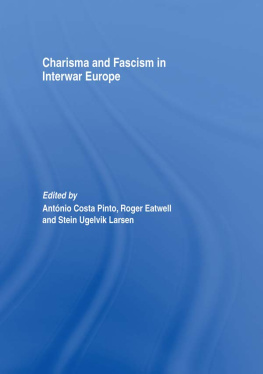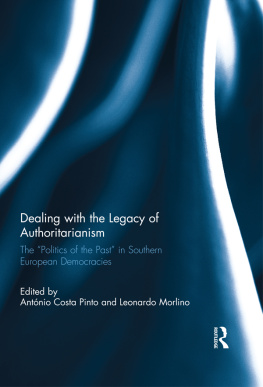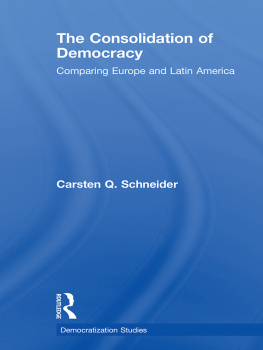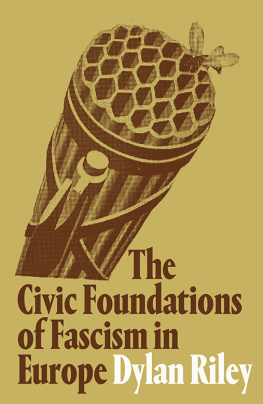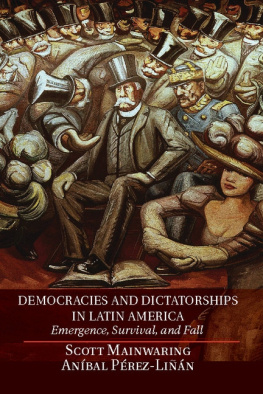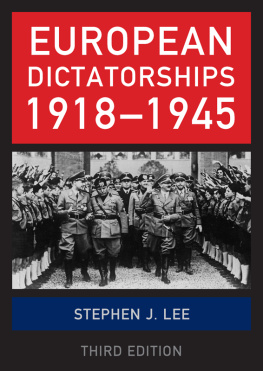An Authoritarian Third Way in the Era of Fascism
This book takes a transnational and comparative approach that analyses the process of diffusion of a third way in selected transitions to authoritarianism in Europe and Latin America.
When looking at the authoritarian wave of the 1930s, it is not difficult to see how some regimes appeared to offer an authoritarian third way somewhere between democracy and fascism. It is in this context that some Iberian dictatorships, such as those of Primo de Rivera in Spain, Salazars New State in Portugal, and the short-lived Dollfuss regime in Austria, are mentioned frequently. Especially during the 1930s, and in those parts of Europe under Axis control, these models were discussed and often adopted by several dictatorships. This book considers how and why these dictatorships on the periphery of Europe, especially Salazars New State in Portugal, inspired some of these regimes new political institutions particularly within Europe and Latin America. It pays special attention to how, as they proposed and pursued these authoritarian reforms, these domestic political actors also looked at these institutional models as suitable for their own countries.
The volume is ideal for students and scholars of comparative fascism, authoritarian regimes, and European and Latin American modern history and politics.
Antnio Costa Pinto is Research Professor at the Institute of Social Sciences, University of Lisbon. His research interests include fascism and authoritarianism, political elites, and democratization. He is the author of The Nature of Fascism Revisited (2012) and Latin America Dictatorships in the Era of Fascism (2020).
Routledge Studies in Fascism and the Far Right
Series editors
Nigel Copsey, Teesside University, UK and Graham Macklin, Center for Research on Extremism (C-REX), University of Oslo, Norway.
This new book series focuses upon fascist, far right and right-wing politics primarily within a historical context but also drawing on insights from other disciplinary perspectives. Its scope also includes radical-right populism, cultural manifestations of the far right and points of convergence and exchange with the mainstream and traditional right.
Titles include:
Global Resurgence of the Right
Conceptual and Regional Perspectives
Edited by Gisela Pereyra Doval and Gastn Souroujon
Contemporary Far-Right Thinkers and the Future of Liberal Democracy
Edited by A. James McAdams and Alejandro Castrillon
Exposing the Right and Fighting for Democracy
Celebrating Chip Berlet as Journalist and Scholar
Edited by Pam Chamberlain, Matthew N. Lyons, Abby Scher and Spencer Sunshine
An Authoritarian Third Way in the Era of Fascism
Diffusion, Models and Interactions in Europe and Latin America
Edited by Antnio Costa Pinto
The Germanic Tribes, the Gods and the German Far Right Today
Georg Schuppener
The Right-Wing Critique of Europe
Nationalist, Souverainist and Right-Wing Populist Attitudes to the EU
Edited by Joanna Sondel-Cedarmas and Francesco Berti
For more information about this series, please visit: www.routledge.com/Routledge-Studies-in-Fascism-and-the-Far-Right/book-series/FFR
An Authoritarian Third Way in the Era of Fascism
Diffusion, Models and Interactions in Europe and Latin America
Edited by
Antnio Costa Pinto
First published 2022
by Routledge
2 Park Square, Milton Park, Abingdon, Oxon OX14 4RN
and by Routledge
605 Third Avenue, New York, NY 10158
Routledge is an imprint of the Taylor & Francis Group, an informa business
2022 selection and editorial matter, Antnio Costa Pinto; individual chapters, the contributors
The right of Antnio Costa Pinto to be identified as the author of the editorial material, and of the authors for their individual chapters, has been asserted in accordance with sections 77 and 78 of the Copyright, Designs and Patents Act 1988.
All rights reserved. No part of this book may be reprinted or reproduced or utilised in any form or by any electronic, mechanical, or other means, now known or hereafter invented, including photocopying and recording, or in any information storage or retrieval system, without permission in writing from the publishers.
Trademark notice: Product or corporate names may be trademarks or registered trademarks, and are used only for identification and explanation without intent to infringe.
British Library Cataloguing-in-Publication Data
A catalogue record for this book is available from the British Library
Library of Congress Cataloging-in-Publication Data
A catalog record has been requested for this book
ISBN: 978-0-367-56962-4 (hbk)
ISBN: 978-0-367-56963-1 (pbk)
ISBN: 978-1-003-10011-9 (ebk)
DOI: 10.4324/9781003100119
Typeset in Times New Roman
by SPi Technologies India Pvt Ltd (Straive)
Contributors
Gabriel Duarte Costaguta is a doctoral student at the Autonoma University of Madrid. He has a bachelors degree and a masters in history from the Catholic University of Rio Grande do Sul, Porto Alegre, Brazil. Among his latest articles is El corporativismo como praxis en la construcin del modelo poltico nacional-estatista en el Brasil de los anos 19301945, Espacio Tempo y Forma, 31, 2019, pp. 6182.
Olivier Dard is a professor of modern history at the University of Paris-Sorbonne. He has published extensively on the right in France during the 1930s, corporatism, and the Vichy regime. His publications include Le corporatisme dans laire francophone au XXme sicle, Charles Maurras: Le matre et laction and Clbrer Salazar en France (19301974): Du philosalazarisme au salazarisme franais (with Ana Isabel Sardinha-Desvgnes, 2018).
Luciano Aronne de Abreu is a full professor in the postgraduate history programme at the Catholic University of Rio Grande do Sul, Porto Alegre, Brazil (PUCRS), and is editor-in-chief of PUCRS publishers (EDIPUCRS). He is the coordinator of the Conselho Nacional de Desenvolvimento Cientfico e Tecnolgicos (CNPq) Political Authoritarianism and the Press in Contemporary Brazil, and Authoritarianism and Corporatism in Comparative Perspective research groups. He has recently published several books, chapters, and articles on the aforementioned topics in important Brazilian and international journals. His latest English-language book is Embracing the Past. Designing the Future: Authoritarianism and Economic Development in Brazil under Getlio Vargas (2020).
Robin de Bruin lectures in Modern European History at the European Studies Department of the University of Amsterdam. He teaches courses about European integration history, the history of the idea of Europe, modern imperialism and decolonization, democracy in the European Union, mental maps of modern Europe, and (anti-)statism. He publishes on European integration history, Europeanization and domestic change, decolonization and European integration, the history of technocratic governance, and Nazi rule in Europe. His recent projects include a textbook on the history of European integration (with Wim van Meurs, Liesbeth van de Grift, Carla Hoetink, Karin van Leeuwen and Carlos Reijnen) entitled The Unfinished History of European Integration


